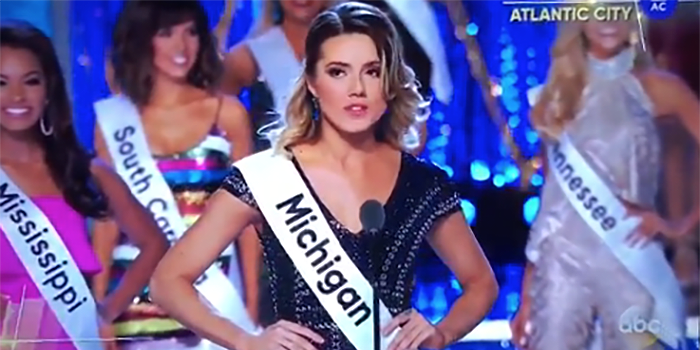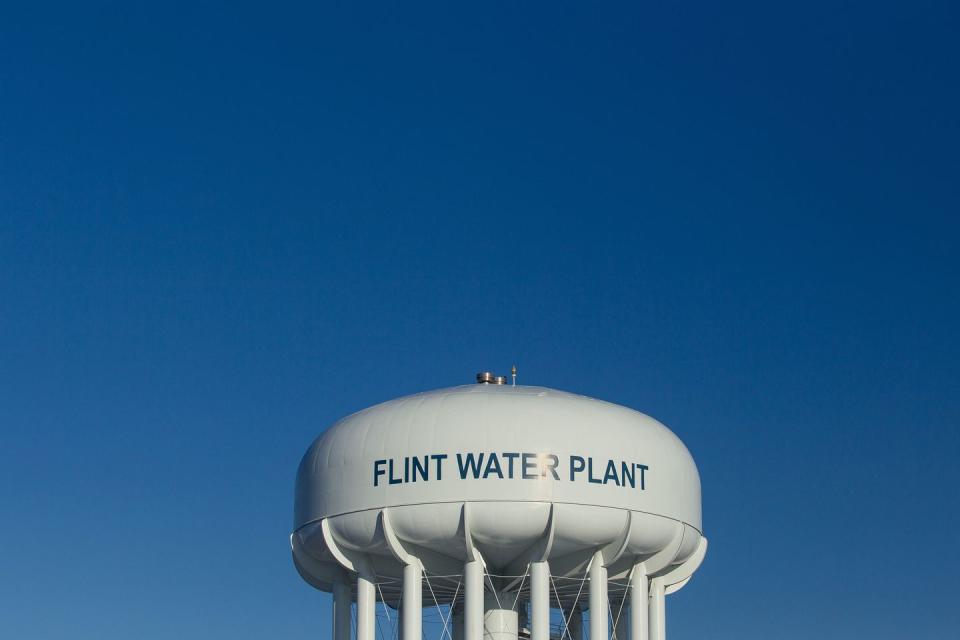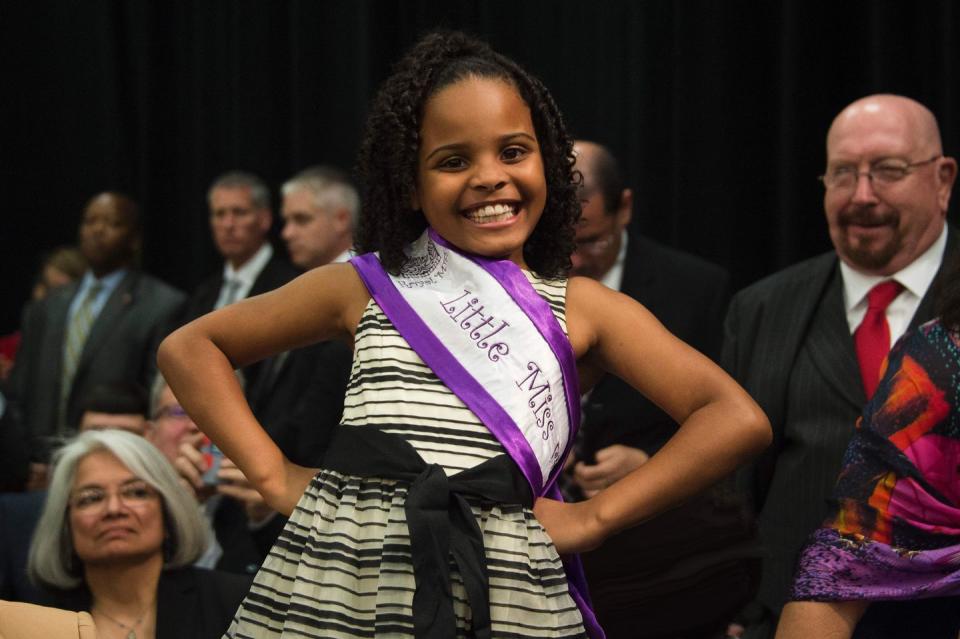Miss Michigan Emily Sioma Discusses Her Viral Miss America Pageant Moment


At the start of the 2019 Miss America competition's live broadcast on Sunday night, all 51 titleholders (that's the 50 states and the District of Columbia) took a minute-well, 8-10 seconds-to introduce themselves on camera. 50 of the contestants stuck to "the script," listing their name, state, and education. Miss Michigan, Emily Sioma, however, did things a little differently.
“from the state with 84 percent of the u.s. fresh water but none for its residents to drink, i am miss michigan emily sioma” - the new #missamerica2019 pageant did not come to play pic.twitter.com/H05eifix2e
- alex rees (@maybealexislost) September 10, 2018
Instead of using her screentime to list her academic credentials-she's a University of Michigan graduate with a major in women studies, by the way-she called out her home state for having "84 percent of the U.S. fresh water, but none for its residents to drink." Though the city of Flint, Michigan had been drawing corrosive water from Lake Huron for its residents (without proper treatment) since 2014, its water crisis became a flashpoint news item in 2016 after a federal state of emergency was declared, not only for the water's health implications-i.e. thousands of the city's children suffering from lead poisoning-but for the light it shone on issues of racial equality, social justice, and poverty in the U.S.
In April 2018-i.e. four years later-Michigan's Governor Rick Snyder deemed the city's water supply "stable," and ended the bottled water distribution program Flint's residents had been relying on. (Some controversy over the standard of water supply still remains, however, and residents' trust in their elected officials has eroded worse than, well, their water pipes.) And drinking water has now also been deemed unsafe in cities and counties across the entire state.

Cosmopolitan.com spoke with Sioma on Monday afternoon about her Miss America journey, her viral moment, and the reactions to it, as she headed back to Michigan to really get her work towards helping alleviate the water crisis started.
A post shared by Miss Michigan (@missamericami) on Jul 10, 2018 at 4:00pm PDT
What is the morning after Miss America like-is there a pageant hangover? How are you feeling a day later?
Well, I think it varies for every woman, depending on her expectations and her mindset going into the pageant. For me, I think it's much different than I expected because I really had no idea that I'd be making national and international headlines.
When did you decide you were going to use your intro moment to speak out about the water crisis in your state?
Well, it definitely was not just in the moment. About two days beforehand, we had a full dress rehearsal and I just thought "Emily, remember why you took this opportunity in the first place." Activism is such a huge part of who I am; I just had this moment thinking, "How am I going to make this moment meaningful?" If you don't make the top 15, you don't have an opportunity to use your voice [beyond the introduction]. So I knew I had, well, basically eight seconds on TV to make a statement and I wanted to use it for something more than for myself.
I want people to keep talking about the water conditions in Michigan, and across the U.S. This is a conversation we need to be having. It's a crisis going on all across the state of Michigan-chemicals known to cause cancer and now lead to developmental disorders [are being found in our water]. They've been found in Flint, in Lansing, Grand Rapids, Kalamazoo, Ann Arbor, Alpena... The Detroit public school system has had to turn off its drinking water. Kids are going back to school and they don't have water to drink because the lead and copper levels are way too high to be safe. I'm so proud of the state of Michigan, but with representing all of the amazing things, you also have to be able to represent the hardships that we're going through. It's unfortunate that truth is so very hard to hear sometimes, but we have to be able to accept these truths and find solutions for our residents and citizens.
Did anyone know beforehand that you were planning to speak out?
All of my sisters knew, because I had practiced it with them-and they all supported me. They held me up, and backed me up the whole time. [After the intro package was finished on stage], they all asked backstage if I'd gone through with it-there's so much feedback on stage that you can't really hear what everyone else is saying. "I can't believe you did it," they said. "You did it, we're so excited for you!"
Sometimes you’ll shock the world with your authenticity
A post shared by Miss Michigan (@missamericami) on Sep 9, 2018 at 5:05pm PDT
Were you worried at all that speaking out like that might have affected your standing in the competition?
For me, it was worth it. On that stage, I was surrounded by some of the most intelligent, beautiful women-I mean, you think you're the best in your state, and then you get to Atlantic City and you're like, "Holy cow!" I knew there was a really good shot that I wouldn't make it into the top 15 because there were just so many amazing candidates. But [Miss America Organization CEO] Regina Hopper has talked about how Miss America is a disrupter, and that's what I did. Crown or not, you have the opportunity to make an impact. I made an impact!
And that also means more people are now paying attention to the Miss America pageant. The more recognition we have, the more people that want to compete, and the more people compete, the more sponsors get interested. And that means more money we can give away. One of the most amazing things about Miss America is that it assists young women in further pursuing their education; every woman who stepped on the Miss America stage last night has won scholarship money-I've earned over $23,000.
And that's why I'm so passionate about making Miss America more inclusive-I want to push people to think about how we can make this Organization more diverse, more financially affordable. It shouldn't be one type of woman that's successful in being able to earn scholarship money. It should be available to anyone who has the confidence, the courage, the principles and the values of the Miss America Organization.
How did you get started in pageants?
I actually didn't start in the Miss America Organization until I was 17 or 18 years old; I didn't watch my first Miss America pageant until then either. The appeal for me was seeing these women in my community who represented such amazing things. They, of course, represented beauty and grace, but they also represented kindness and empowerment. I looked up to them.
Then, of course, you get the bug-I love competing and being on stage. I'm a dancer, and I love that adrenaline rush. I absolutely adore interviews; any time I get to talk, I love to be able to promote my platform, or "social impact initiative." It's called "I Believe You: Supporting Survivors of Sexual Violence."
A post shared by Miss Michigan (@missamericami) on Aug 6, 2018 at 2:51pm PDT
I'm a survivor of sexual assault. And through my experience, on the University of Michigan campus, I realized that we all need to do a better job supporting survivors. [Sexual assault] happens to one in five women and one in ten men in their lifetime, and being a survivor becomes a part of your identity for the rest of your life. And everyone's journey to recovery is different. We have to be making sure we're thinking about that, we're cognizant of that-and also cognizant of the fact that being a survivor looks different in every community.
You've described yourself as an activist-how do you embody that principle? What does activism mean to you?
For me, I think about 'servant leadership.' That's the kind of activism I want to be a part of. You're in there, you're doing that, the dirty work. We've got one Earth, we have one country, one state, one community that we're a part of-well, we're all actually a part of many communities, and we have the obligation to make sure we're doing the most we can to make life a little bit better for the people [in those communities] around us.
A post shared by Miss Michigan (@missamericami) on Aug 5, 2018 at 7:52am PDT
I'm very, very grateful for all the privileges and opportunities that I have in my life, and I'm passionate about using those privileges to help other people out.
Outgoing Miss America Cara Mund has spoken often about her political aspirations, and being the first female Governor of North Dakota, her state. Given the platform you've now been afforded, do you see politics in your future?
Well, definitely don't count me in just yet! I still have to go to grad school. I have lots of life to live before I want to delve into politics. But I will always be someone who will join the fight to make sure that people's voices are being heard and that people have an opportunity, especially an equitable opportunity.
Do you think that, as Miss Michigan or Miss America in today's culture, there's a responsibility to be political or politically active?
That's a tough question, because [as state titleholders] we do represent so much more than ourselves. But I always encourage women I meet in the organization not to lose themselves in the job either. I don't think that Miss America can be an apolitical figure because so much of our world is politicized, so I just want the women who are in these positions, the women who are granted the opportunity from all of their hard work to represent their state, their nation, to be really strong in their values. And to know that you just have to do in your heart what feels right.
I chose to talk about the water crisis because I know I'll have the opportunity to meet with political leaders and government officials now that I am Miss Michigan. I don't have the logistical answers or even the legislative answers to the crisis; I also know that I am not the first, I will not be the last person to be talking about this issue.

I'm here to help open the door for the conversations to happen, to keep the balls rolling, and to uplift the voices of the leaders in the movements in these communities-so that they can tell their truth, because they are the experts and they have the personal experience [to speak on]. I'm not speaking for anybody, but using my voice to elevate theirs. Do you know Mari Copeny, Little Miss Flint? She actually reached out to me on Twitter after all of this broke and she said, "I would love to meet you in person." And that, to me, is why I did what I did.
('You Might Also Like',)

